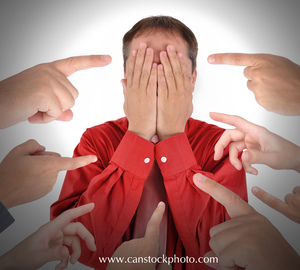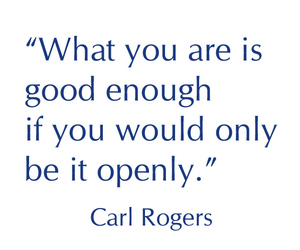Imagine making a mistake that holds potential consequences for your family or the people at your work. As you sit there alone, aware that it's your mistake, and you must disclose it, what is your internal dialogue? What are the words you're likely to call yourself?
If you're like most people, the words you'll direct at yourself will be condemning. These harsh words spring from shame, which is the moral condemnation that guilt becomes when you believe something you did wrong means something is wrong with you.
 Freud defined shame as the fear of loss of love, which leads to being controlled by what others think and say about you. "[It's] the fear of disconnection," says Dr. Brené Brown, "... of being perceived as flawed and unworthy of acceptance or belonging."
Freud defined shame as the fear of loss of love, which leads to being controlled by what others think and say about you. "[It's] the fear of disconnection," says Dr. Brené Brown, "... of being perceived as flawed and unworthy of acceptance or belonging."
And it's very stressful. Margaret Kemeny's research found that stress caused by how others view you is extremely powerful, as much or more so than [that] caused from ... working too hard." Her research found that "acute threats to our social self increase stress hormones and proinflammatory cytokine activity occurring in concert with shame."
In short, shame is a condition that can seriously compromise the brain function that enables you to succeed and the immune function that keeps you healthy.
Albert Ellis, the founder of Cognitive Behavioral Therapy, found that there are two shame-based sentences that people tell themselves.
1. The first sentence is: I made a mistake; I made an error, and I got it wrong. This may invoke feelings of guilt or frustration, but if we were to stop here, the crisis would only represent an error to correct or a lesson to learn, extending the opportunity to grow or advance.
2. The second sentence is: This mistake I made ... This event that turned out badly ... This thing I got wrong ... This way I behaved ... it means that there's something wrong with me. This is guilt or frustration becoming shame. It has us saying to ourselves I'm not good enough; I'm not smart enough; I'm not worthy enough; all of which calcify into the belief that I deserve whatever punishment is coming. And it's this sentence -- this belief -- that does the damage.
Shame is psychologically painful, which makes us afraid to make a mistake, more because of the emotional punishment we inflict on ourselves than for anything the world might do to us. Eventually, a shame-based mind represses its mistakes to avoid feeling bad, preventing the possibility of learning from a mistake, which only increases the likelihood of repeating the blunder. Thus, mistakes can't teach us anything. We become afraid to take risks, which limits our growth.
The problem with repression is that it isn't selective. We can't numb ourselves to difficult feelings, such as shame, without numbing ourselves to empowering feelings, like joy, passion, and peace, and this lessens our sense of self. We form facades and pretenses to compensate, which of course makes us feel even more inauthentic. As a result, we can't see what's right or true about us, and a narrow view of our strengths, talents, and contributions take hold. Research shows that people struggle at naming a few good points about themselves, but easily fill two pages of things they perceive as faults.[*]
Obviously, we need to deal with shame... but how?
Happily, the antidote to shame is simpler than you might think, although not necessarily easy. But life gets easier the more you apply the medicine.  The cure is found in the words of Carl Rogers, arguably one of America's greatest psychologists.
The cure is found in the words of Carl Rogers, arguably one of America's greatest psychologists.
Becoming good enough begins with accepting yourself exactly as you are. It's closing the gap between "I am" and "I should be," between the authentic you that's true and realizable, and the ideal self that's illusion and therefore unachievable.
It's being mindful of facades and pretenses, so you can let them go. It's understanding that it really doesn't help to act one way on the outside when you actually feel another way inside. It doesn't help to pretend to know the answer when you don't.
It's being open to your experience, listening to yourself with acceptance. It's learning to identify clearly what you're feeling. The more you're able to experience all of your feelings, the less you're afraid of any of your feelings, including shame.
This facilitates the courage to accept that you're not perfect or infallible; that you make mistakes, that you don't always function in the best way or always achieve the best result. No one does. Ironically, the courage to be imperfect opens the way to experiencing the whole of you. It quiets the critical, condemning voice of shame, so that it no longer negates the better angels of your nature or blocks your strengths and talent. This quality of undefended openness is what leads to the realization that what you are is good enough.
In this way, your experience gradually becomes your authority. Other people's ideas, judgments, and perceptions, while considered, cease to over-rule or control you. By definition, that's personal power. Your relationships also become more meaningful and alive because your deepening sense of connection with yourself increases your regard and empathy for others.
Cultivate this way of being and your life will transcend shame, sparing you the trouble it makes.
[*] Herbert Arthur Otto, A Guide to Developing Your Potential (North Hollywood, CA: Wilshire Book Co., 1977), 172.